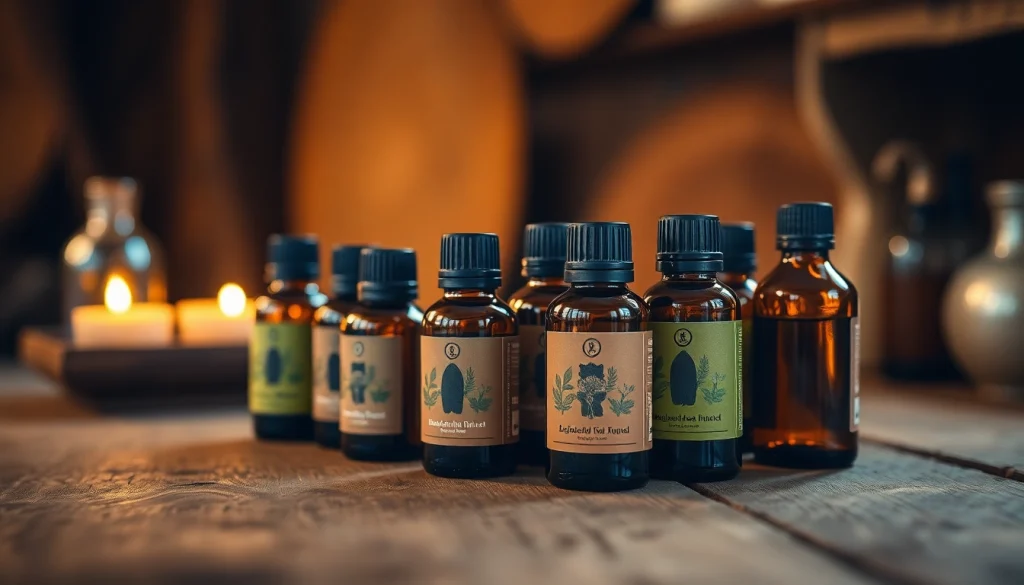Understanding Essential Oil: A Beginner’s Guide
Essential oils have taken the wellness world by storm, gaining popularity for their myriad uses and benefits. These concentrated plant extracts are formulated to capture the essence of their source, offering everything from delightful aromas to therapeutic properties. In this guide, we will explore essential oils in depth, covering their quality, benefits, and safe usage to empower you on your journey toward a more therapeutic lifestyle. For a deeper dive into high-quality options, consider checking out essential oil products that prioritize purity and effectiveness.
What Are Essential Oils?
Essential oils are volatile compounds extracted from various parts of plants, including leaves, flowers, seeds, and roots. These oils carry the unique scent and characteristics of the plant from which they are derived. The extraction methods can vary, with steam distillation and cold pressing being the most commonly used techniques. Essential oils are not only used for their fragrance but have also been linked to various therapeutic effects, garnering interest from both consumers and researchers.
The Importance of Quality in Essential Oil
The quality of essential oil is paramount since it influences its effectiveness and safety. Essential oils can be categorized into pure, diluted, and synthetic forms. Pure essential oils are extracted without additives, while diluted oils may have carrier oils added to increase volume and safety. Synthetic oils, on the other hand, often contain artificial components that can hinder the therapeutic benefits associated with pure oils. When choosing essential oils, consider factors such as the sourcing of ingredients, production methods, and third-party testing for purity.
Common Uses of Essential Oil in Daily Life
Essential oils have a variety of applications in everyday life, including:
- Aromatherapy: Using diffusers to disperse the pleasant scents of essential oils can enhance mood and promote relaxation.
- Topical applications: Diluted essential oils can be applied to the skin to manage various conditions, from inflammation to acne.
- Home cleaning: Oils like tea tree and lemon have antibacterial and antifungal properties, making them effective natural cleaning agents.
- Personal care: Many people incorporate essential oils into their beauty routines, adding them to lotions and serums for added scent and benefits.
Diving Deeper into Essential Oil Benefits
Essential Oil for Physical Health
Various essential oils have been shown to provide physical health benefits. For instance, eucalyptus oil may support respiratory health, while peppermint oil can alleviate headaches and improve digestion. Lavender, well-known for its calming properties, may help reduce stress-related symptoms such as elevated heart rates and anxiety.
Furthermore, essential oils like rosemary and ginger have anti-inflammatory properties, making them useful in pain management, particularly for conditions like arthritis and muscle soreness. Regular use of essential oils may not only enhance quality of life but also serve as complementary therapy in managing chronic conditions.
Emotional and Mental Benefits of Essential Oil
Essential oils are also recognized for their mental and emotional health benefits. The practice of aromatherapy, which involves inhaling the aromas from essential oils, has been linked to improvements in mood, stress reduction, and cognitive function. Oils like bergamot and jasmine are known for their uplifting effects, while oils such as chamomile and ylang-ylang can promote relaxation and reduce anxiety.
Studies have indicated that aromatherapy can influence limbic brain activity, which is connected to emotions, memory, and feelings. As a result, integrating essential oils into your daily routine can have profound implications for emotional well-being.
Choosing the Right Essential Oil for Your Needs
Selecting the right essential oil begins with understanding your needs. For stress relief, oils like bergamot, lavender, or frankincense may be beneficial. If you are looking to boost energy levels, citrus oils such as orange or lemon could be suitable. It’s essential to take time to explore different oils and how they resonate with you on both a mental and physical level.
Additionally, consider sourcing oils from reputable brands that provide information on the extraction process and quality testing. Experimenting with small quantities can help you gauge which oils work best for your specific requirements.
How to Safely Use Essential Oil
Basics of Dilution and Application
Using essential oils safely is crucial to prevent adverse reactions. Most essential oils must be diluted before being applied to the skin to avoid irritation. Carrier oils such as coconut oil or jojoba oil can be used for this purpose; a common ratio is around three drops of essential oil for every tablespoon of carrier oil.
Methods of application include:
- Topical application: Targeting specific areas of the body to treat issues like muscle pain or skin irritations.
- Aromatherapy: Utilizing diffusers or inhalers to enjoy the oil’s scent while reaping mood-enhancing benefits.
- Bathing: Adding essential oils to bathwater can create a therapeutic soak, enhancing relaxation and providing skin benefits.
Potential Risks and Side Effects of Essential Oil
While essential oils offer numerous benefits, they can pose risks if not used properly. Some individuals may experience allergic reactions or skin sensitization. Furthermore, oils like cinnamon and clove can be particularly potent and may cause irritation if applied neat (undiluted) to the skin.
Pregnant women, children, and individuals with certain medical conditions should consult a healthcare professional before using essential oils. It is also prudent to conduct a patch test before using a new oil to assess for any adverse reactions.
Essential Oil Safety Tips and Guidelines
To ensure a safe experience with essential oils, follow these guidelines:
- Always dilute essential oils before topical application.
- Store oils in a cool, dark place to prolong their shelf life and maintain quality.
- Use oils only as directed and avoid ingesting essential oils unless advised by a medical professional.
- Keep essential oils out of reach of children and pets.
- Be mindful of using oils around sensitive areas such as the eyes and mucous membranes.
Integrating Essential Oil into Your Routine
Creating Customized Essential Oil Blends
One of the joys of using essential oils is the ability to create customized blends tailored to your preferences and needs. Whether you aim for a calming blend for relaxation or an invigorating fragrance for energy, blending oils can yield delightful and unique experiences.
Start by choosing a base oil, then layer various other oils based on their complementing scents. A popular blend may consist of lavender, sweet orange, and frankincense for a calming yet uplifting experience. Keep notes on proportions and effects to refine your recipes over time.
Essential Oil in Diffusers and Home Fragrances
Diffusers are a popular means of dispersing essential oil throughout your home, transforming your living space into a haven of soothing scents. Electric diffusers, reed diffusers, and candle diffusers are a few options available, each providing varying intensity and duration of fragrance. Essential oils can also be incorporated into homemade room sprays, potpourri, or added to cleaning solutions to create a fresh ambiance.
Consider seasonal scents as well; for example, citrus oils can invigorate during summer, while a blend of pine, cinnamon, and cedarwood can create a cozy atmosphere in winter.
Incorporating Essential Oil into Skincare
Essential oils can greatly enhance your skincare regimen. Many oils possess natural properties such as antiseptic and anti-inflammatory effects, making them suitable for treating skin conditions such as acne or eczema. Oils like tea tree and lavender can be particularly beneficial.
To use essential oils in skincare, dilute them with a carrier oil and incorporate them into your moisturizers, serums, or even homemade face masks. Always conduct a patch test, as sensitivity can vary from person to person.
Measuring the Impact of Essential Oil on Your Well-being
Tracking Benefits Over Time with Essential Oil
Integrating essential oils into your life can be transformative, but tracking their impacts requires a balanced approach. Keeping a journal can help record how you feel before and after using specific essential oils. Documenting experiences can offer insight into patterns, helping you refine your oil selection and usage over time.
Consider metrics like mood, stress levels, energy, or skin conditions as measurable parameters to assess whether the use of essential oils aligns with your wellness goals.
Community Experiences and Testimonials
Sharing experiences within the essential oil community can provide encouragement and inspiration. Many individuals have experienced significant benefits from using essential oils, from improved mental clarity to reduced anxiety and enhanced physical health.
Participating in local workshops or online forums can foster insights into how others effectively use oils, discover new blends, and learn about safety practices and product quality.
Resources for Further Learning about Essential Oil
As you continue to explore the world of essential oils, numerous reputable resources can expand your knowledge:
- Books: Consider reading titles focused on aromatherapy and essential oils to gain a fundamental understanding and advanced insights.
- Online courses: Many platforms offer courses about essential oil blending, safety, and therapeutic uses.
- Websites and blogs: Follow trusted sources for the latest research, safety tips, and how-to guides on essential oil integration.



